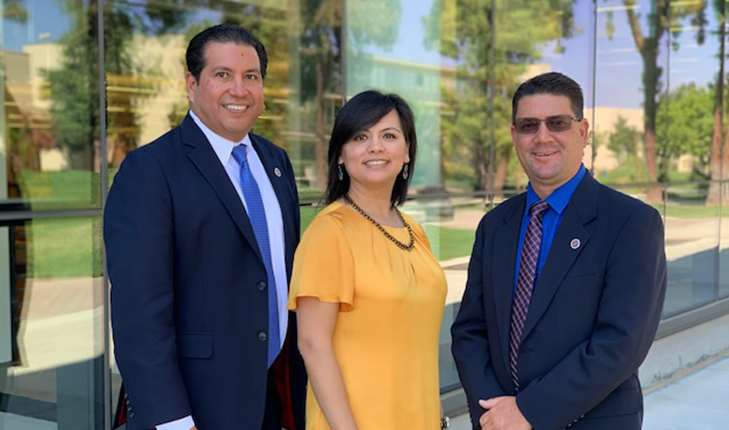The National Science Foundation has awarded three grants totaling nearly $800,000 to faculty in the Lyles College of Engineering at Fresno State.
The first grant will support the Alliances for Graduate Education and the Professoriate program to improve the pathway and success of underrepresented minority graduate students, postdoctoral fellows and faculty who want to teach or conduct research in science, technology, engineering and mathematics (STEM) fields.
Four California State University campuses will participate in the program, including Fresno State, Dominguez Hills, Cal Poly San Luis Obispo and Cal Poly Pomona. Fresno State received $221,950 of the $1.3 million award.
“Fresno State is excited to partner with Cal Poly San Luis Obispo, Cal Poly Pomona and CSU Dominguez Hills to support underrepresented minority faculty in science, technology, engineering and mathematics (STEM) fields using a strengths-based approach for faculty success,” said Dr. Bryan Berrett, director of the Center for Faculty Excellence at Fresno State who will serve as the principal investigator.
The co-principal investigators for Fresno State are Dr. Rudy Sanchez, interim associate vice president for Academic and Institutional Effectiveness and Dr. Brissa Quiroz, Lyles College of Engineering civil engineering professor and director of the Valley Industry Partnership for Cooperative Education Program.
“It is imperative to have more STEM faculty that mirror the students we are serving,” Quiroz said. “The goal of the grant is to train newly hired tenure-track CSU faculty to learn what their strengths are and help them utilize these strengths to reach their full potential as advanced educators. My hopes are that through senior faculty mentoring and training opportunities, this will remove obstacles for advancement and level-up the playing field.”
Fresno State is designated as a Hispanic-Serving Institution by the U.S. Department of Education and an Asian American/Native American/Pacific Islander-Serving Institution.
“Drs. Berrett, Sanchez and Quiroz are experienced faculty and University leaders, and well-equipped to lead the charge with this research,” said Dr. Ram Nunna, dean of the Lyles College. “This is an excellent opportunity to ensure the successful development of our future academic leaders through a proven approach resulting in greater opportunities for our diverse students.”
The next two NSF grants totaling $552,474 were awarded to Dr. Zhi Liang, assistant professor of mechanical engineering. The grants will help provide educational opportunities for underrepresented high school students in the Central Valley, train Lyles College students to conduct research in micro/nanoscale heat transfer, and help guide students to doctoral programs in STEM fields.
“These awards will allow me to conduct the research I enjoy, while supporting and training Lyles College of Engineering students continuously for three years,” Liang said. “This will ensure students have enough time to learn fundamentals in the research area and obtain publishable results.”
One grant will support research using numerical and theoretical methods to study the evaporation rate of liquid droplets, particularly micro/nanodroplets to understand different conditions.
“For example, if a cup of water is sprinkled on the ground, water will evaporate much faster on the ground than in the cup due to the significant increase of the total area of water-air interfaces,” Liang said.
The second grant will help Liang use the same methods to understand the merging dynamics of nanobubbles and the resulting capillary force between adjoining particles.
“Due to their unique properties, nanobubbles are extremely useful in a broad range of areas such as water treatment, bioremediation of groundwater pollution, surface cleaning and the growth of plants and fish,” he said.
According to preliminary market research conducted by the Fine Bubble Industries Association, the size of the nanobubbles business is projected to increase from $20 million in 2010 to $4.3 billion in 2020, Liang said.
“Dr. Liang’s grants are significant because he is receiving national recognition for his innovative research in the emerging fields of nanodroplets and nanobubbles,” Nunna said. “This is cutting-edge research. It will enable him to provide opportunities for our diverse students and give them hands-on experience and an advantage in the job market upon graduation.”





